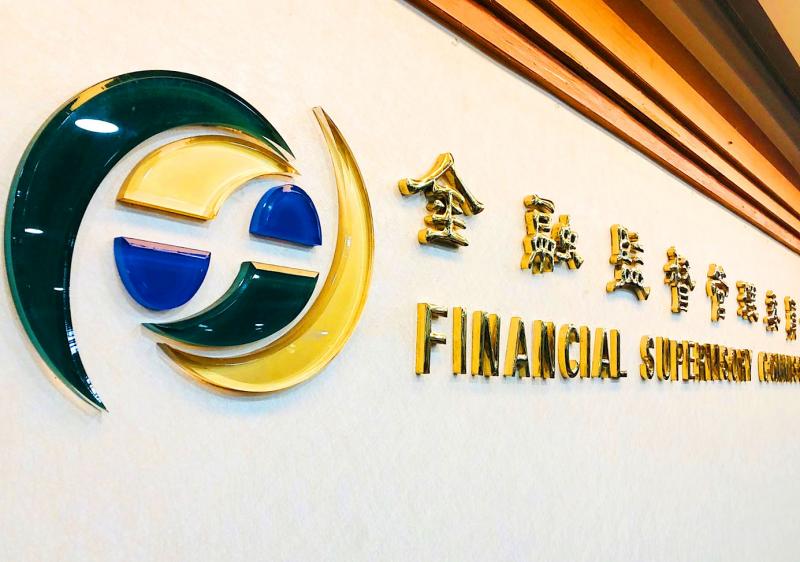The Financial Supervisory Commission is to tighten regulations on local banks’ customer relationship managers from Jan. 1 next year following a series of cases of managers stealing money from their clients over the past two years, the commission said yesterday.
That would be the second time the commission has toughened its stance on customer relationship mangers since 2019, as the previous rule changes have not effectively stopped managers from stealing cash from their clients, the commission told a videoconference.
The commission has fined E.Sun Commercial Bank (玉山銀行), Cathay United Bank (國泰世華銀行) and Taishin International Bank (台新銀行) for thefts committed by their customer relationship mangers since the stricter regulations took effect in 2019, commission data showed.

Photo: Wang Meng-lun, Taipei Times
The new rules would stipulate that banks should ban customer relationship managers from producing bank statements and offering them directly to clients, as the statements were often used as a tool in theft cases, the commission said.
Banks must instead send bank statements to clients by mail or e-mail, instead of via customer relationship mangers, Banking Bureau Chief Secretary Hou Li-yang (侯立洋) said.
The statements should at least include information on returns on investment programs, account balances, investment targets and traded units, so clients can check whether their customer relationship manager is lying about their investment programs, Hou added.
Some banks would need time to update their information technology and mailing systems to comply with the new rules, which is one of the reasons the new regulations would take effect next year, he said.
Under new rules, banks must inspect their customer relationship managers’ computers to see if they have produced bank statements, he said.
Some banks are already in the habit of examining the computers to prevent fraud, but not all, so the new regulations specifically demand that banks perform such examinations, Hou added.
The commission has issued fines totaling NT$163 million (US$5.83 million at the current exchange rate) on more than 10 banks for theft since 2018, and banks must strengthen the supervision of their customer relationship managers, it said.

In Italy’s storied gold-making hubs, jewelers are reworking their designs to trim gold content as they race to blunt the effect of record prices and appeal to shoppers watching their budgets. Gold prices hit a record high on Thursday, surging near US$5,600 an ounce, more than double a year ago as geopolitical concerns and jitters over trade pushed investors toward the safe-haven asset. The rally is putting undue pressure on small artisans as they face mounting demands from customers, including international brands, to produce cheaper items, from signature pieces to wedding rings, according to interviews with four independent jewelers in Italy’s main

Japanese Prime Minister Sanae Takaichi has talked up the benefits of a weaker yen in a campaign speech, adopting a tone at odds with her finance ministry, which has refused to rule out any options to counter excessive foreign exchange volatility. Takaichi later softened her stance, saying she did not have a preference for the yen’s direction. “People say the weak yen is bad right now, but for export industries, it’s a major opportunity,” Takaichi said on Saturday at a rally for Liberal Democratic Party candidate Daishiro Yamagiwa in Kanagawa Prefecture ahead of a snap election on Sunday. “Whether it’s selling food or

CONCERNS: Tech companies investing in AI businesses that purchase their products have raised questions among investors that they are artificially propping up demand Nvidia Corp chief executive officer Jensen Huang (黃仁勳) on Saturday said that the company would be participating in OpenAI’s latest funding round, describing it as potentially “the largest investment we’ve ever made.” “We will invest a great deal of money,” Huang told reporters while visiting Taipei. “I believe in OpenAI. The work that they do is incredible. They’re one of the most consequential companies of our time.” Huang did not say exactly how much Nvidia might contribute, but described the investment as “huge.” “Let Sam announce how much he’s going to raise — it’s for him to decide,” Huang said, referring to OpenAI

Nvidia Corp’s negotiations to invest as much as US$100 billion in OpenAI have broken down, the Wall Street Journal (WSJ) reported, exposing a potential rift between two of the most powerful companies in the artificial intelligence (AI) industry. The discussions stalled after some inside Nvidia expressed concerns about the transaction, the WSJ reported, citing unidentified people familiar with the deliberations. OpenAI makes the popular chatbot ChatGPT, while Nvidia dominates the market for AI processors that help develop such software. The companies announced the agreement in September last year, saying at the time that they had signed a letter of intent for a strategic